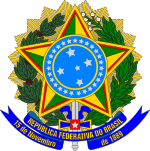
Back سياسة البرازيل Arabic Braziliyanın dövlət quruluşu Azerbaijani Държавно устройство на Бразилия Bulgarian Gobierno y política de Brasil Spanish سیاست در برزیل Persian Brasilian politiikka Finnish Politique au Brésil French Política do Brasil Galician פוליטיקה של ברזיל HE ბრაზილიის პოლიტიკური სისტემა Georgian
Politics of Brazil Política do Brasil | |
|---|---|
 | |
| Polity type | Federal presidential constitutional republic |
| Constitution | Constitution of Brazil |
| Legislative branch | |
| Name | National Congress |
| Type | Bicameral |
| Meeting place | National Congress Palace |
| Upper house | |
| Name | Federal Senate |
| Presiding officer | Rodrigo Pacheco, President of the Federal Senate |
| Lower house | |
| Name | Chamber of Deputies |
| Presiding officer | Arthur Lira, President of the Chamber of Deputies |
| Executive branch | |
| Head of state and government | |
| Title | President |
| Currently | Luiz Inácio Lula da Silva |
| Appointer | Direct popular vote |
| Cabinet | |
| Name | Cabinet of Brazil |
| Current cabinet | Second cabinet of Lula da Silva |
| Leader | President |
| Deputy leader | Vice President |
| Appointer | President |
| Headquarters | Palácio do Planalto |
| Ministries | 37 |
| Judicial branch | |
| Name | Judiciary of Brazil |
| Courts | Federal courts of Brazil |
| Supreme Federal Court | |
| Chief judge | Luís Roberto Barroso |
| Superior Court of Justice | |
| Chief judge | Maria Thereza Moura |
| This article is part of a series on the |
 |
|---|
The politics of Brazil take place in a framework of a federal presidential representative democratic republic, whereby the President is both head of state and head of government, and of a multi-party system. The political and administrative organization of Brazil comprises the federal government, the 26 states and a federal district, and the municipalities.
The federal government exercises control over the central government and is divided into three independent branches: executive, legislative and judicial. Executive power is exercised by the President, advised by a cabinet. Legislative power is vested upon the National Congress, a two-chamber legislature comprising the Federal Senate and the Chamber of Deputies. Judicial power is exercised by the judiciary, consisting of the Supreme Federal Court, the Superior Court of Justice and other Superior Courts, the National Justice Council and the Regional Federal Courts.
The states are autonomous sub-national entities with their own governments that, together with the other federal units, form the Federative Republic of Brazil. Currently, Brazil is divided politically and administratively into 27 federal units, being 26 states and one federal district. The executive power is exercised by a governor elected to a four-year term. The judiciary is exercised by courts of first and second instance addressing the common justice. Each state has a unicameral legislature with deputies who vote on state laws. The Constitution of Brazil knows also two elements of direct democracy, stated in Article 14.[1] The legislative assemblies supervise the activities of the Executive power of the states and municipalities.
The municipalities are minor federal units of the Federative Republic of Brazil. Each municipality has an autonomous local government, comprising a mayor, directly elected by the people to a four-year term, and a legislative body, also directly elected by the people.
Brazil has an unrestricted multiparty system with a large number of political parties. Some parties lack ideological consistency and it is common for congressmen to switch parties, weakening electoral coalitions. At same time, the high number of political parties makes the Executive need to gather alliances of different political parties must piece together diverse and often ideologically incoherent coalitions to pass legislation (this is known as coalition presidentialism).[2][3][4] The Economist Intelligence Unit's Democracy Index rated Brazil as a "flawed democracy" in 2022.[5] Brazil was 2023 the 13th most electoral democratic country in Latin America and the Caribbean according to the V-Dem Democracy indices.[6]
- ^ "Brazil: Freedom in the World 2021 Country Report". Freedom House. Retrieved 10 August 2021.
- ^ "Presidencialismo de coalizão: qual sua relação com a crise brasileira?". Politize! (in Brazilian Portuguese). 10 May 2016. Retrieved 10 August 2021.
- ^ Couto, Lucas; Soares, Andéliton; Livramento, Bernardo (12 March 2021). "Presidencialismo de coalizão: conceito e aplicação". Revista Brasileira de Ciência Política (in Brazilian Portuguese) (34): e241841. doi:10.1590/0103-3352.2021.34.241841. Retrieved 10 August 2021.
- ^ "Democracy Index 2022: Frontline democracy and the battle for Ukraine" (PDF). Economist Intelligence Unit. 2023. p. 3.
- ^ V-Dem Institute (2023). "The V-Dem Dataset". Retrieved 14 October 2023.